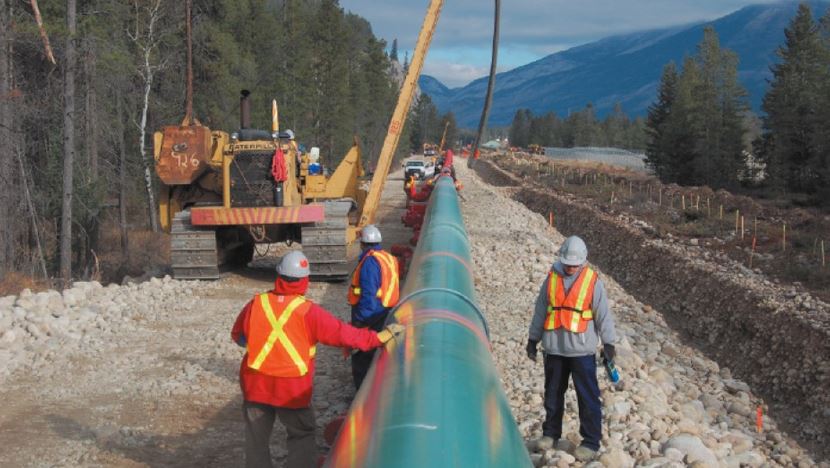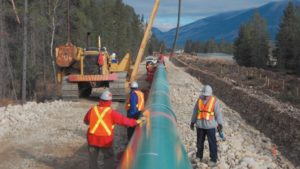Trudeau says Trans Mountain pipeline “will be built”

By Peter Kennedy
 Despite opposition from environmental activists and governments in British Columbia, Prime Minister Justin Trudeau vowed that Kinder Morgan Canada‘s [KML-TSX] Trans Mountain Pipeline expansion project “will be built.”
Despite opposition from environmental activists and governments in British Columbia, Prime Minister Justin Trudeau vowed that Kinder Morgan Canada‘s [KML-TSX] Trans Mountain Pipeline expansion project “will be built.”
During a speech in Victoria, B.C. Thursday April 5, Trudeau said his government has gone further than any of its predecessors to save Canada’s precious air, land and water.
“Friends, it is precisely because of these stringent measures that we can stand behind our approval of the Trans Mountain Pipeline extension with confidence,” he said.
“This project will be safe, jobs will be created; this pipeline will be built.”
During the Victoria speech, Trudeau reminded his audience that the Trans Mountain pipeline has been present on the British Columbia coast for over 60 years, transporting safely in its waters.
What was approved by the Federal Government and the National Energy Board, he said, was the twinning of an existing pipeline to increase capacity
“Before we made this decision, we made sure that every measure had been taken to keep our oceans safe,” he said.
“I would not have approved this pipeline if I had not been confident of that.”
The original Trans Mountain Pipeline was built in 1953 and continues to operate today. The proposed expansion is essentially a twinning of the existing 1,150-kilometre pipeline between Edmonton, Alberta and Burnaby, British Columbia.
Expected to cost approximately $7.4 billion, it will create a pipeline system with a nominal capacity rising from 300,000 barrels per day to 890,000 barrels per day.
Trudeau’s comments will be welcomed by supporters of the project, including Alberta Senator Doug Black, who introduced a bill in February (2018) in a bid to have Ottawa declare that the Trans Mountain pipeline expansion is in Canada’s national interest.
When the bill was introduced, Black warned that not having access to energy markets is costing Canada billions of dollars and the expansion of the Trans Mountain pipeline system between Edmonton, and Burnaby, B.C., is a critical solution to this problem, he said.
“We need to create a situation where action can be taken to advance this project, which is in the general interest of Canada,” Black said.
However, Trans Mountain Expansion faces significant hurdles, including opposition from British Columbia Premier John Horgan who has vowed to “use every tool in the toolbox” to prevent it from going ahead.
Horgan’s NDP government has asked to courts to clarify whether or not it can use provincial powers to restrict Alberta’s bitumen flows, while conducting scientific studies to determine the environmental impacts of bitumen oil spills.
As well, the City of Burnaby has taken its fight against construction of the Trans Mountain pipeline expansion to Canada’s highest court, after lower courts and the National Energy Board rejected its challenge.
Burnaby Mayor Derek Corrigan says he doesn’t believe Burnaby should pay for policing costs of the long running project against the project in his city.
Corrigan said the city plans to ask the Supreme Court of Canada to hear its challenge to the National Energy Board decision which said Kinder Morgan is not required to comply with two sections of Burnaby’s bylaws on land and tree clearance as it expands the pipeline.
The city of Burnaby filed for leave to appeal the NEB decision in February, but the Federal Court of Appeal denied its application last week.
Here are some additional facts about the pipeline expansion.
During construction, the equivalent of 15,000 people will be working on the pipeline expansion, said Kinder Morgan, adding that the expansion will create the equivalent of 37,000 direct, indirect and indirect jobs during operation.
Kinder Morgan says the combined impact on government revenue for construction and the first 20 years of expanded operations is $46.7 billion, revenues that the company said can be used for public services such as health care and education – British Columbia receives $5.7 billion, Alberta receives $19.4 billion and the rest of Canada receives $21.6 billion.
Three new berths will be built at Westridge Marine Terminal in Burnaby.
Once the new berths are completed and in service, the number of tankers loaded at the Westridge Marine Terminal could increase to approximately 34 per month.
It will consist of roughly 980 km of new pipeline.
73% of the route will use the existing right of way, 16% will follow other linear infrastructure, such as telecommunications, Hydro or highways, and 11% will be new right of way.
The new pipeline will carry heavier oils with the capability for transporting light crude oils.
Meanwhile, the cost of petroleum products in B.C. can only rise as the existing Trans Mountain pipe is operating at capacity and oil trains from Alberta are also maxed out.
Vancouver’s Lower Mainland region relies on receiving petroleum products from Washington state.
